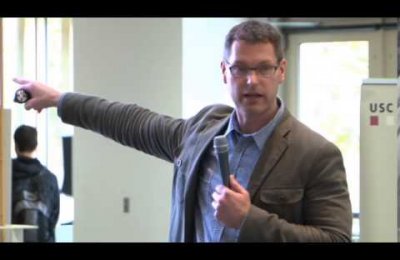By Jackson DeMos
Chris Barr, senior editorial director for Yahoo! News, gave USC Annenberg students tips on writing for the Web and search-engine optimization (SEO) during a Nov. 9 visit (view his presentation) to the School.
Barr, the lead editor of "The Yahoo! Style Guide: The Ultimate Sourcebook for Writing, Editing, and Creating Content for the Digital World," met with students from the "Daily Trojan" and Neon Tommy before keynoting an open event in a packed classroom. Below is a brief overview of what he told the students.
Writing for the Web
"Don’t bury the lede," Barr said. "Front-load the most important information in the first paragraph above the 'fold.' You have five to 10 seconds to hook readers. If you bury the lede on the Web, readers won't invest time in the story."
A few other tips from Barr about writing for the Web:
- Shape your text for online reading. People read computer screens differently than printed materials. Modify your writing to get your message across.
- Get to the point. Put the most important information up front, where readers can find it quickly.
- Make text scannable. Arrange your content so that it’s easy to scan for key words and phrases.
- Write for the world. The Web is available around the globe. Will your text be understood in Hong Kong? New Delhi? Rome?
- Improve readability and navigation. It’s not just the designer’s job to make a website easy to use—it’s the content creator’s too.
Headline Writing

"If you can't, your piece may lack focus," he said. "Stay under 65 characters. Why? Because after that search engines won’t index it."
He gave multiple examples of actual print headlines that don't work online, including: "Scents lighten up for spring," "Classic Easter fare: a grilled, herb-laden ham," "Oakland behind the curve on hunger for street eats," "State accuses Mercury Insurance."
He changed those same headlines to: "Reviews of new spring perfumes," "Book reveals history of Easter ham," "Trendy street food vendors struggle with Oakland laws," and "Mercury Insurance may have violated CA laws."
"Accuracy and clarity are more important than cleverness," Barr said. "You want to lure readers, but you don’t want to be sensational or sound like an advertisement."
Other tips on headline writing from his presentation:
- Front-load: Put the most relevant words first.
- Try subject-verb-object structure to put the actor and the action right up front: "Apple covers up exploding iPods."
- Use concrete keywords, like proper nouns. Which words would readers search for? Try typing your draft headline into a search box. Has anyone else used the headline? Are you using the best keywords?
- Favor strong, interesting verbs, simple present tense, and active voice: "Home prices crash" is stronger than "Home prices are falling."
Search-Engine Optimization and Linking
Barr said search-engine optimization is simply a set of strategies for making a page easier to find. A high search rank means that more people are likely to find a link to your page on a search engine such as Yahoo! or Google.
Search engines crawl the whole page, but they give particular weight to:
- Page <title>
- Headline
- Other bold headings and subheadings
- Links
- Bulleted and numbered lists
- Introduction and conclusion
The "Yahoo! Style Guide" has an entire chapter on SEO, but he stressed the importance of repeating each keyword between two and four times in a 300-word story — without making the text sound artificial or repetitive. He also said to link to three relevant pages in each story.
Other Tips
He told students to keep stories short and concise, so it's time to finish up this article. However, he also advised students to give readers a next step and actionable takeways at the end of an article.
"Never leave readers at a dead end, with no links or to-dos," he said.
Therefore, please take a look at the following links:
"The Yahoo! Style Guide"
View Chris Barr's presentation
Upcoming USC Annenberg events
Master's in Journalism program








